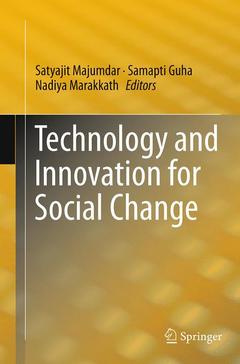Description
Technology and Innovation for Social Change, Softcover reprint of the original 1st ed. 2015
Language: English
Subjects for Technology and Innovation for Social Change:
Publication date: 09-2016
Support: Print on demand
Publication date: 12-2014
208 p. · 15.5x23.5 cm · Hardback
Description
/li>Contents
/li>Biography
/li>Comment
/li>
Tension exists between technologists and social thinkers because of the impact technology and innovation have on social values and norms, which is often viewed as damaging to the cultural fabric of a nation or society. Since the global business environment is the context in which implementation of technology and innovation takes place, it is widely accepted as the major reason for such conflicts. In this backdrop, this edited book integrates independent research from across the globe. It deals with the nature and significance of technology, innovation and social change as well as the relationships between them, and discusses the significance of social entrepreneurship from social innovation and technology perspectives.
Research areas covered are related to the development and deployment of technology, innovation and knowledge in social change, capabilities of institutions, models, role of government and corporate social responsibility and community involvement. Multiple aspects of social change are discussed in the context of India, Mexico, Thailand, Cambodia, Laos, Vietnam, Ethiopia, Nigeria and other African countries. But society does not silently accept technologically enforced changes; sometimes technology is seen as an enemy of inclusive growth and for many, economic development is an anti-thesis of social change. Selected case studies on sector-specific technologies, such as the use of genetically modified seeds in agriculture, which has impacted the market and society, are critically analyzed to develop insights into the adoption of technology and its impact. At the same time it examines policy related issues, without any bias in favor of, or against, a specific technology.Chapter 1. Technology and Innovation for Social Change: An Introduction.- Theme 1: Concepts and Critical Analysis.- Chapter 2. Social innovation: Towards a conceptualisation.- Chapter 3. Relevance of social enterprises for micro-entrepreneurial growth: A case based discussion on Indian microfinance models.- Theme 2: Institutional Systems.- Chapter 4. Development Strategy in the Northern State of Jalisco from the Institutional Perspective.- Chapter 5. Technological Utilization in Africa: Does Institution Matter?.- Chapter 6. Creating Social Change through Entrepreneurship Education: An Effectuation Model at TATA Institute of Social Sciences (TISS), Mumbai, India.- Theme 3: Transformation.- Chapter 7. Technology and Innovation for Create Social Change: Concepts and Theories.- Chapter 8. Social Change using Innovation and Technology.- Chapter 9. Impact of Technology and Social Change on the Family in Nigeria.- Theme 4: Case Studies.- Chapter 10. Bt Cotton in India: Debates Surrounding Agricultural Biotechnology in India.- Chapter 11. Revival of and Social Change: Case Study on Dholka.- Chapter 12. Technology and Social Change among the HoAdivasis (Tribals) of West Singhbhum, Jharkand, India.
Satyajit Majumdar is a Professor at the Center for Social Entrepreneurship in the School of Management and Labour Studies of Tata Institute of Social Sciences, Mumbai (India) and teaches entrepreneurship, growth and technology strategy, corporate social responsibility and service operations management. He has published research papers and case studies in the areas of entrepreneurship, social entrepreneurship, small business, growth strategy and corporate social responsibility. He also reviews research papers for international journals and evaluates research scholars for awarding doctoral degrees. Prof. Majumdar advises organizations and young entrepreneurs, and mentors entrepreneurs and start-up organizations. He is member of expert panel of United Nations Conference on Trade and Development (UNCTAD), Geneva, Switzerland on ‘pro-poor investment’ related educational initiatives in higher education of the developing and developed countries, member of Academic Councils, Board of Studies of universities and Editorial Boards of scholarly journals, and member of advisory boards of educational, research and business organizations.
Samapti Guha is an Associate Professor at the Centre for Social Entrepreneurship, School of Management and Labour Studies, Tata Institute of Social Sciences. She teaches macro economics, social entrepreneurship, microfinance, Marxian economics, development economics and micro economics. She has many research articles in national and international journals and also in books. She received NET-JRF from University Grants Commission to pursue her Doctoral Study. She has obtained a PhD degree in Economics from Jadavpur University, West Bengal. Dr. Guha was Sir Ratan Tata Fellow at the Asia Research Centre in London School of Economics and Political Science, London, UK in 2006-07. She has presented research papers in several national and international Conferences. She is mentoring Microfinance Institutions, Socialentrepreneurs a




